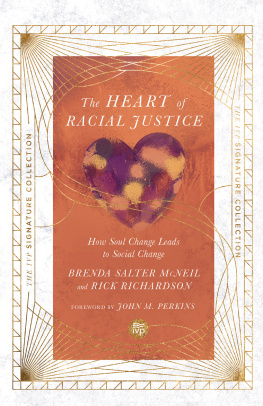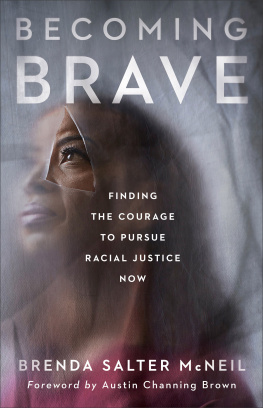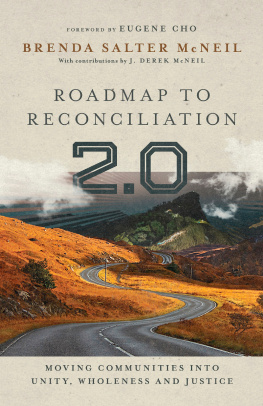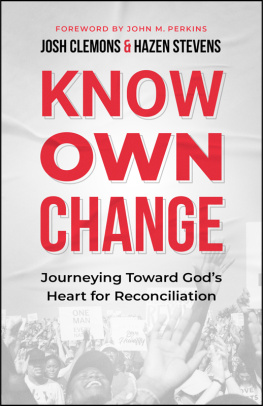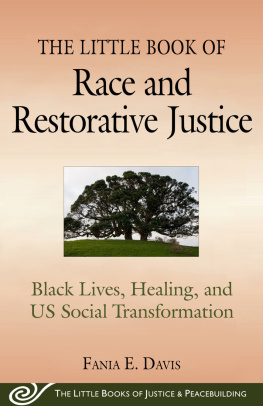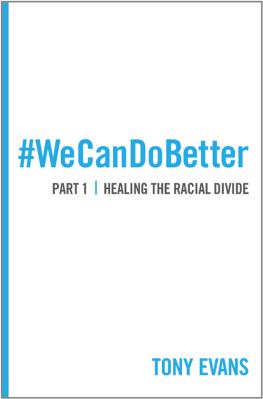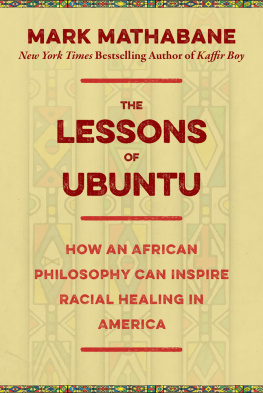Sommaire
Pagination de ldition papier
Guide
InterVarsity Press
P.O. Box 1400, Downers Grove, IL 60515-1426
ivpress.com
Preface to the Signature edition 2022 by Brenda Salter McNeil
Expanded edition 2009 by Brenda Salter McNeil and Rick Richardson
First edition 2004 by Brenda Salter McNeil and Rick Richardson
All rights reserved. No part of this book may be reproduced in any form without written permission from InterVarsity Press.
InterVarsity Press is the book-publishing division of InterVarsity Christian Fellowship/USA, a movement of students and faculty active on campus at hundreds of universities, colleges, and schools of nursing in the United States of America, and a member movement of the International Fellowship of Evangelical Students. For information about local and regional activities, visit intervarsity.org.
Scripture quotations, unless otherwise noted, are from the New Revised Standard Version Bible, copyright 1989 National Council of the Churches of Christ in the United States of America. Used by permission. All rights reserved worldwide.
While any stories in this book are true, some names and identifying information may have been changed to protect the privacy of individuals.
The publisher cannot verify the accuracy or functionality of website URLs used in this book beyond the date of publication.
Cover design and image composite: David Fassett
Image: glittering gold background: MirageC / Moment Collection / Getty Images
ISBN 978-0-8308-4874-4 (digital)
ISBN 978-0-8308-4873-7 (print)
This digital document has been produced by Nord Compo.
In loving memory, to my father,
Leon J. Salter, a genuinely crosscultural person.
Brenda
To Ronald V. Myers Sr., Nina Lau Branson,
Pedro Aviles, Peter Cha and Brenda Salter McNeil,
dear friends and mentors on the racial justice journey
Rick
FOREWORD
John M. Perkins
F rom a historical perspective, Sam Hines, Tom Skinner and I were reconciliations first generation of pioneer evangelicals in the early 1960s. In the 1990s, Spencer Perkins and Chris Rice, Raleigh Washington and Glen Kehrein, Bill McCartney and others pushed reconciliation into the evangelical mainstream. Now, in this groundbreaking book, Brenda Salter McNeil and Rick Richardson are taking the reconciliation and justice movement to an even higher plain.
During much of the history of the Christian church, the Holy Spirit and the kingdom of God have been tragically divorced. This separation has allowed many Euro-American Christians to engage in ethnocentrism and oppression against ethnic groups. In The Heart of Racial Justice, the authors have essentially remarried the Spirit and the kingdom. Only the Holy Spirit can give us the power and wisdom to incarnate the kingdom of God here on earth. Only the Holy Spirit can heal the wounds of racism and empower us to do justice. This book holistically blends the Holy Spirit, the kingdom, justice and reconciliation, bringing together the concepts have been long separated.
I congratulate InterVarsity Christian Fellowship for leading the way among Christian organizations in wrestling with ethnic and diversity issues. I remember when Pete Hammond and I began this process of wrestling with these issues in Mississippi in the late 1970s. It was then that the InterVarsity board of directors made reconciliation a priority. In large measure this book reflects twenty-five years of struggle and success by InterVarsity.
The Heart of Racial Justice is deeply rooted in the gospel. This is the essence of racial, economic and social justice. God has made us stewards of the earth, and it is unfortunate that the Christian church has never quite understood what Paul meant when he said, Now all things are of God, who has reconciled us to Himself through Jesus Christ, and has given us the ministry of reconciliation (2 Corinthians 5:18 NKJV). We must stop reading only one dimension of meaning in that verse and embrace the two-dimensional perspective that leads us to reconcile not only with God but with one another, thus enriching our lives for the kingdom of God.
Promise Keepers, led by Bill McCartney, was the first attempt in my lifetime to massively present reconciliation as a blueprint for proclaiming the gospel. When Jesus said By this all will know that you are My disciples, if you have love for one another (John 13:35 NKJV), he was basing our love for each other as one of the determining factors for us becoming new creatures. Paul explains, If anyone is in Christ, he is a new creation; the old has gone, the new has come! (2 Corinthians 5:17 NIV). I thank Rick and Brenda for their work at clarifying this issue in these pages.
It is sad that in an enlightened world the Christian church even needs to deal with these issues today. Racial reconciliation has not been adequately addressed within the body of Christ. What Rick and Brenda do in this biblically grounded book is to make reconciliation practical through the example of their friendship, reflecting on those who have gone on before them and building on (and appreciating) what each one has to offer. I highly recommend that you take time to read The Heart of Racial Justice. It is a blueprint for the Christian church. We at the Christian Community Development Association (CCDA) want to make this one of our handbooks for the CCDA movement, because we view reconciliation as a practical reality that intersects all areas of our lives
All of this is from God who has reconciled us to himself and given us the ministry of reconciliation. Brenda and Rick have given us a challenge. I pray that all who read this book, especially those in the body of Christ, will take the challenge and become the next great generation of loving reconcilers!
PREFACE TO THE SIGNATURE EDITION
Brenda Salter McNeil
F or years, many people assumed that the United States of America had become a post-racial society. We believed that we were people who valued diversity, democracy and equality for all. In fact, we held our country up as a beacon for others to follow so all people could have the right to life, liberty and the pursuit of happiness. That supposedly is what democracy is all abouta society where all people are treated equally and have an equal right to liberty and justice under the law.
However, Covid-19 and the racial hostility boiling over in the streets of our nation have magnified a reality that was true all alongwe are anything but united. We see this in the stark difference between the death rates of people of color and White people, and in the biased responses police and our political leaders have toward Black people protesting and White people storming government buildings with assault rifles. Black people protesting because the police are killing them are called thugs and ordered to be shot. Angry White people spitting on police and storming the Capitol building are called good people who are understandably frustrated, and they are not harmed at all.
These realities arent making this country more racist; instead they are magnifying the fact that the United States has never been honest about how divided and hateful it is. This is the world were living in, and this is who we really are. The coronavirus and police brutality have only fanned the flames of the division, hypocrisy, white supremacy and xenophobia that already existed.

